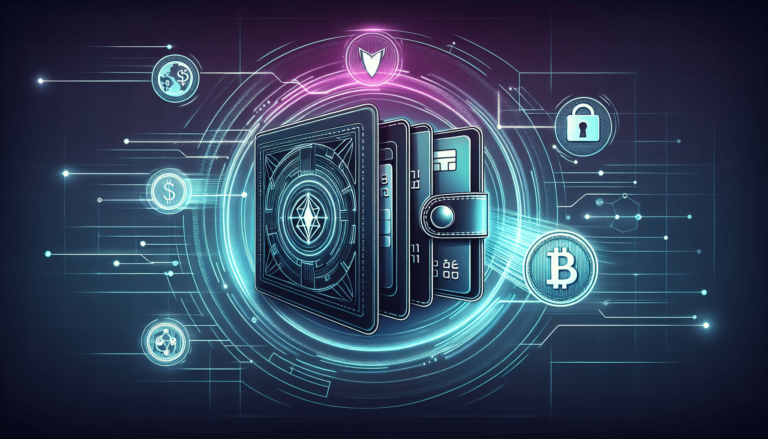What Is Blockchain?

Imagine a revolutionary technology that has the power to transform the world as we know it, that has been hailed as the backbone of cryptocurrencies like Bitcoin. You may have come across the term “blockchain” before, but do you truly understand what it is? In essence, blockchain is a decentralized ledger that records and verifies transactions across multiple computers. But its potential goes far beyond the realm of finance, with applications in industries ranging from healthcare to supply chain management. Join us as we unravel the mysteries of this groundbreaking technology and uncover the endless possibilities it holds.
What is blockchain?

Definition of blockchain
Blockchain is a revolutionary technology that is changing the way we store and exchange digital information. It can be described as a decentralized and transparent digital ledger that is used to record and verify transactions across multiple computers or nodes. Unlike traditional databases, which are typically controlled by a central authority, blockchain allows for peer-to-peer interactions where all participants have access to the same information.
How does blockchain work?
Blockchain operates through a network of computers, known as nodes, which work together to validate and record transactions in a sequential and chronological order. Each transaction is bundled into a block, containing a unique identifier called a hash. This hash is generated through a complex mathematical algorithm that ensures the security and integrity of the block.
Once a block is validated and added to the blockchain, it becomes permanent and cannot be altered. This immutability provides a high level of trust and transparency, as any attempt to tamper with the data would require a consensus from the majority of nodes in the network. This decentralized nature of blockchain eliminates the need for intermediaries or third parties, reducing the risk of fraud, censorship, and single points of failure.
Benefits of blockchain technology
Blockchain technology offers numerous benefits across various industries and sectors.
One of the key advantages of blockchain is its transparency. Since all transactions are recorded on a public ledger, it allows for greater accountability and trust between participants. No single entity can control or manipulate the data, making it more difficult for fraud or corruption to occur.
Another benefit is the increased security offered by blockchain. The use of cryptographic algorithms ensures that the data stored on the blockchain is tamper-proof. This makes it highly resistant to hacking and unauthorized access. Additionally, the decentralized nature of blockchain makes it less vulnerable to single points of failure, as the data is distributed across multiple nodes.
Blockchain also enables faster and more efficient transactions. The traditional process of verifying and settling transactions can be time-consuming and costly. With blockchain, transactions can be processed and settled in real-time, eliminating the need for intermediaries and reducing transaction fees.
The use of smart contracts is another feature of blockchain that offers significant advantages. Smart contracts are self-executing contracts with the terms of the agreement directly written into code. They automatically execute when the specified conditions are met, eliminating the need for intermediaries and reducing the risk of human error.
Challenges and limitations of blockchain
While blockchain technology offers numerous benefits, it also faces several challenges and limitations.
One of the major challenges is scalability. As the number of transactions on the blockchain network increases, so does the size of the blockchain. This can result in longer processing times and increased storage requirements, making it difficult to handle large volumes of transactions.
Another challenge is the energy consumption associated with blockchain. The process of validating and adding blocks to the blockchain requires a significant amount of computational power, which translates to high energy consumption. This can be problematic from an environmental standpoint and can also make blockchain less cost-effective for certain applications.
Privacy is another limitation of blockchain technology. While blockchain provides transparency and immutability, it also poses challenges in terms of protecting sensitive or confidential information. As all transactions are recorded on a public ledger, there is a need to balance transparency with privacy, especially in sectors such as healthcare or finance, where sensitive information is involved.

Different types of blockchain
There are different types of blockchain, each with its own specific characteristics and applications.
Public blockchains are open to anyone and allow for full participation and transparency. They are typically used in cryptocurrencies, where anyone can join the network, validate transactions, and create new blocks. Examples include Bitcoin and Ethereum.
Private blockchains, on the other hand, are permissioned and restrict access to a select group of participants. They are commonly used in enterprise settings, where privacy and control over the network are important. Private blockchains offer faster transaction times and increased scalability compared to public blockchains.
Hybrid blockchains combine the features of both public and private blockchains. They allow for a certain degree of openness and transparency, while also providing privacy and control over the network. Hybrid blockchains are often used in consortiums or industry-specific applications.
Blockchain vs. traditional databases
Blockchain and traditional databases differ in several key aspects.
One of the main differences is the way data is stored and verified. In a traditional database, data is typically stored in a centralized location, controlled by a single entity. This centralization can make the database vulnerable to attacks or corruption. In contrast, blockchain stores data across multiple nodes in a decentralized manner, ensuring data integrity and immutability.
Another difference is the level of transparency and trust provided. Traditional databases rely on a central authority to authenticate and validate transactions, whereas blockchain allows for peer-to-peer interactions and verification. This peer-to-peer validation provides increased transparency and reduces the need for trust in intermediaries.
Furthermore, blockchain offers enhanced security compared to traditional databases. The use of cryptography and consensus algorithms makes it extremely difficult for hackers to alter or manipulate the data. In contrast, traditional databases can be vulnerable to breaches and unauthorized access.
Applications of blockchain
Blockchain technology has a wide range of applications across various industries.
In the finance industry, blockchain is being used to streamline and automate processes such as payments, remittances, and securities trading. The use of blockchain in finance eliminates the need for intermediaries, reduces settlement times, and provides greater transparency and auditability.
In supply chain management, blockchain is being utilized to track and trace the movement of goods throughout the supply chain. It helps to improve efficiency, reduce fraud, and ensure the authenticity and quality of products. With blockchain, stakeholders can have real-time visibility into the provenance and history of products, enhancing trust and accountability.
In the healthcare sector, blockchain is being explored to securely store and share patient records, ensuring that sensitive information is protected and accessible only to authorized parties. It also has the potential to improve the interoperability of different healthcare systems, enabling seamless exchange of data and promoting better patient care.
Blockchain in finance industry
The finance industry has been one of the early adopters of blockchain technology. Blockchain has the potential to transform various aspects of finance, from payments and remittances to securities trading and identity verification.
One key application of blockchain in finance is in cross-border payments and remittances. Traditional cross-border transactions can be slow, expensive, and subject to intermediaries. With blockchain, these transactions can be settled in real-time, with lower fees and greater transparency.
Blockchain is also being utilized in securities trading and settlement. By digitizing assets and using blockchain for settling trades, the process can become more efficient and secure. Blockchain allows for faster settlement times and reduces the risk of fraud or manipulation.
Furthermore, blockchain has the potential to revolutionize identity verification and Know Your Customer (KYC) processes. By storing identity information on a blockchain, individuals can have control over their own data and easily share it with financial institutions when needed. This can enhance privacy and reduce the risk of identity theft.
Blockchain in supply chain management
Supply chain management is another area where blockchain is making a significant impact. Blockchain technology can provide transparency, traceability, and accountability throughout the supply chain, helping to reduce fraud, improve efficiency, and enhance consumer trust.
By recording every transaction and movement of goods on the blockchain, stakeholders can have a real-time view of the entire supply chain network. This visibility helps to identify bottlenecks, track the provenance of products, and ensure compliance with regulations.
Blockchain also allows for the verification of product authenticity. Counterfeit products are a major problem in many industries, and blockchain can help to prevent the distribution of counterfeit goods. By using unique identifiers on the blockchain, such as RFID tags or QR codes, consumers can verify the authenticity of products and make informed purchasing decisions.
Additionally, blockchain can improve supply chain financing by providing a secure and decentralized platform for invoice factoring and supply chain financing. By digitizing invoices and using smart contracts, the process of financing and settling invoices can become faster and more efficient, benefiting both suppliers and buyers.
Blockchain in healthcare
Blockchain has the potential to transform the healthcare industry by improving the security, accessibility, and interoperability of patient data.
One of the key challenges in healthcare is the secure storage and sharing of patient records. With blockchain, patient records can be encrypted and stored on a decentralized ledger, ensuring that sensitive information is protected. Patients can have control over their own data and easily share it with healthcare providers when needed, reducing the risk of data breaches and improving privacy.
Blockchain also enables interoperability between different healthcare systems. The fragmentation of healthcare data across various systems and providers makes it difficult to exchange information and coordinate care. By using blockchain, healthcare data can be standardized and easily shared, leading to better care coordination and improved patient outcomes.
Another application of blockchain in healthcare is in clinical trials and research. Blockchain can provide a secure and transparent platform for storing and sharing clinical trial data, ensuring the integrity and authenticity of the results. This can help to speed up the development of new drugs and treatments, benefiting both patients and researchers.
In conclusion, blockchain is a transformative technology that has the potential to revolutionize various industries. Its decentralized and secure nature provides increased trust, transparency, and efficiency in transactions and data storage. While blockchain still faces certain challenges and limitations, its benefits outweigh the drawbacks, making it an innovative solution for solving complex problems in today’s digital world. Whether it is in finance, supply chain management, or healthcare, blockchain has the ability to reshape the way we store, exchange, and verify information.








